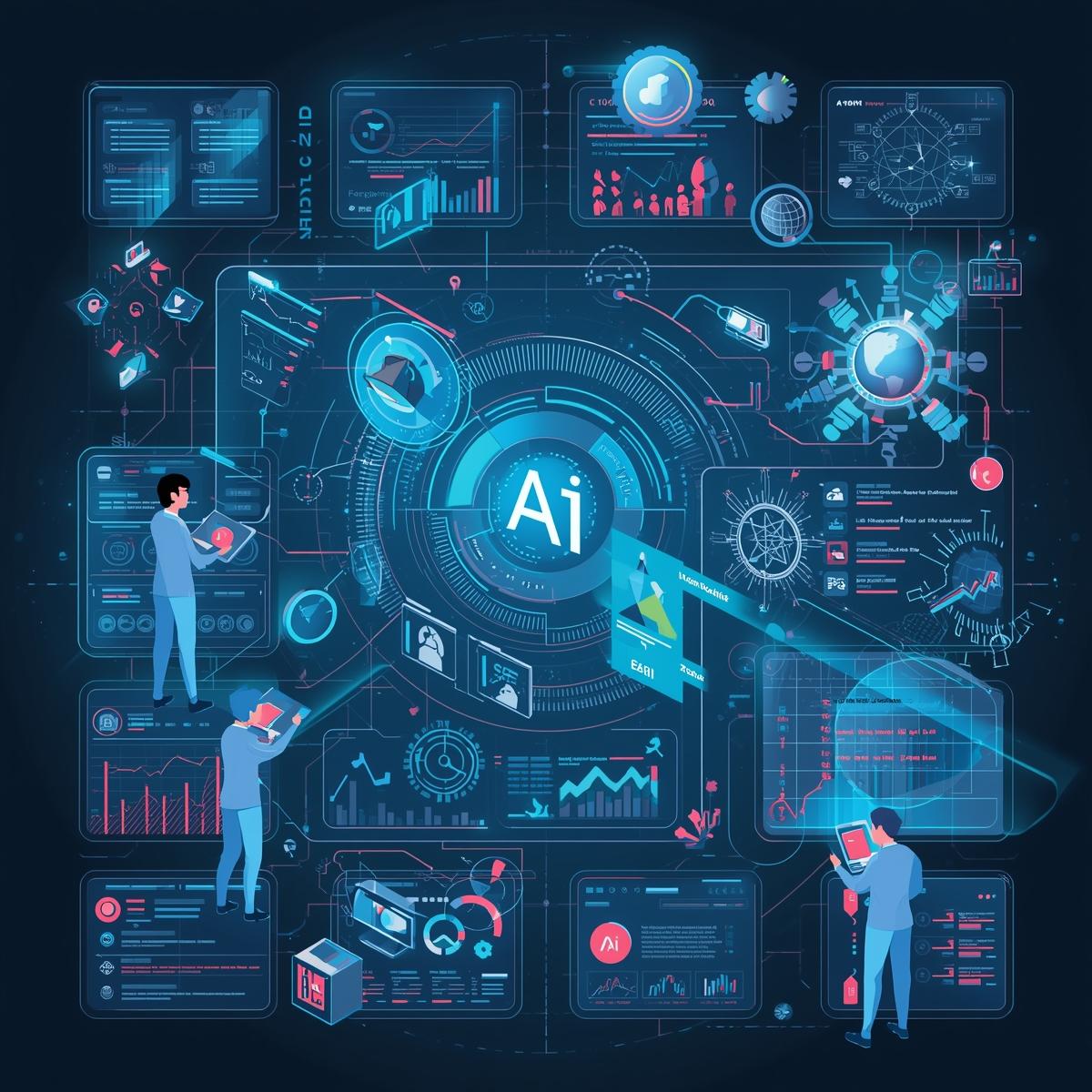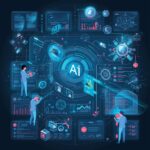
How AI is Revolutionizing Customer Personalization in Digital Marketing
Introduction– AI is Revolutionizing Customer Personalization in Marketing
In today’s competitive digital landscape, customer personalization has become a cornerstone of successful marketing strategies. Businesses no longer rely solely on generic campaigns; instead, they strive to deliver tailored experiences that resonate with each individual customer. This is where Artificial Intelligence (AI) comes into play. AI in digital marketing is revolutionizing the way brands understand and interact with their audiences, making personalization more accurate, dynamic, and scalable than ever before.
Traditionally, personalization efforts were limited to basic segmentation, such as age, location, or purchase history. While useful, these methods often failed to capture the complexity of customer behavior. With AI, marketers can now analyze vast amounts of data from multiple sources—including browsing history, social media activity, and past purchases—to create highly personalized marketing campaigns. Machine learning algorithms can predict what products or content a customer is likely to engage with, while natural language processing (NLP) tools can craft messages that feel uniquely tailored to the recipient.
According to recent studies, companies that leverage AI-driven personalization see a significant boost in customer engagement, satisfaction, and overall revenue. Personalized marketing powered by AI not only enhances the customer experience but also increases loyalty and conversion rates. From e-commerce platforms recommending products to email campaigns dynamically adapting content based on user behavior, AI is transforming personalization into a strategic advantage for businesses worldwide.
In this blog, we will explore how AI is revolutionizing customer personalization in marketing, the technologies behind it, the benefits it brings, real-world examples, and practical steps businesses can take to implement AI-driven personalization effectively.
What is Customer Personalization in Marketing?
Customer personalization in marketing refers to the practice of tailoring marketing messages, offers, and experiences to individual customers based on their unique preferences, behaviors, and needs. Unlike generic campaigns that target a broad audience, personalization aims to make each customer feel recognized and valued, enhancing engagement and driving conversions.
Traditionally, personalization was limited to basic segmentation, such as demographics, geographic location, or past purchase history. While helpful, this approach often lacked depth, leaving marketers unable to anticipate evolving customer preferences. Today, AI-driven personalization takes this to the next level by analyzing large datasets from multiple touchpoints, enabling marketers to predict what a customer wants before they even express it.
With AI, businesses can deliver personalized marketing campaigns across various channels, including email, social media, websites, and mobile apps. For example, e-commerce platforms can recommend products based on browsing patterns, while streaming services suggest content based on viewing history. The power of AI allows for dynamic personalization, where campaigns adapt in real-time according to customer behavior, making interactions more relevant and impactful.
Effective customer personalization leads to higher engagement, improved customer satisfaction, and increased loyalty. In addition, personalized experiences can reduce marketing costs by targeting resources more efficiently and improving ROI. As businesses continue to embrace AI in digital marketing, customer personalization is evolving from a nice-to-have strategy into a critical component of competitive advantage.
Role of AI in Marketing Personalization
The role of AI in marketing personalization is transforming the way businesses connect with their customers. Artificial Intelligence enables marketers to analyze vast amounts of data quickly and accurately, uncovering patterns and insights that would be impossible to detect manually. This allows brands to deliver personalized marketing campaigns that resonate with individual customers, enhancing engagement and driving conversions.
One of the key advantages of AI is its ability to predict customer behavior. By leveraging machine learning algorithms, AI can analyze past interactions, purchase history, browsing behavior, and even social media activity to forecast what products, services, or content a customer is most likely to engage with. This predictive capability ensures that marketing efforts are highly relevant, reducing wasted resources and increasing ROI.
AI also powers real-time personalization. For instance, e-commerce platforms can instantly adjust product recommendations based on a visitor’s actions on the website, while email marketing platforms can tailor content dynamically to match a subscriber’s interests. Similarly, AI chatbots and virtual assistants provide personalized support by understanding customer queries and responding in ways that feel customized, improving overall customer experience.
Moreover, AI integrates data from multiple channels to create a 360-degree view of the customer, allowing marketers to deliver consistent and relevant messaging across websites, mobile apps, social media, and email. This omnichannel personalization ensures that each interaction reinforces the brand experience and strengthens customer loyalty.
In essence, AI is no longer just a tool for automation—it is a strategic driver of customer personalization in marketing. Businesses that leverage AI effectively can anticipate customer needs, provide timely recommendations, and create a more engaging, personalized experience that leads to higher conversions and long-term loyalty.
Key AI Technologies Transforming Personalization
AI is driving the next generation of customer personalization in marketing through a variety of advanced technologies. These tools enable businesses to understand customer behavior, predict preferences, and deliver highly relevant experiences. Here are the key AI technologies transforming personalization today:
Machine Learning and Predictive Analytics
Machine learning is the backbone of AI-powered personalization. By analyzing historical data, predictive analytics can forecast customer behavior, helping marketers recommend products, content, or services that a user is most likely to engage with. For example, e-commerce platforms use machine learning to suggest items based on previous purchases, while streaming services predict what shows or music a user will enjoy. This allows businesses to deliver personalized marketing campaigns that feel intuitive and relevant, boosting engagement and conversion rates.
Natural Language Processing (NLP)
NLP enables computers to understand and respond to human language. In marketing, NLP powers AI chatbots, personalized email content, and dynamic messaging. By analyzing customer interactions and sentiment, NLP tools can tailor communication in real time, ensuring messages resonate with the recipient. For instance, a chatbot can suggest products or answer queries in a conversational tone, providing a seamless and personalized customer experience.
Computer Vision
Computer vision is another AI technology enhancing personalization, especially in retail and e-commerce. By analyzing images and videos, computer vision can detect customer preferences and recommend products visually. For example, fashion retailers use computer vision to suggest outfits based on uploaded photos or browsing behavior. This visual-based personalization adds another layer of engagement and relevance for customers.
AI-Powered Analytics Platforms
Modern AI analytics platforms integrate data from multiple sources, including social media, websites, and mobile apps, to create a comprehensive 360-degree view of the customer. These platforms provide actionable insights, allowing marketers to design hyper-personalized campaigns and track their performance. With AI-powered dashboards, businesses can continually optimize their strategies, ensuring every touchpoint delivers maximum value.
By leveraging these AI technologies, businesses can implement dynamic, real-time personalization, creating marketing experiences that feel unique to each customer. This not only enhances customer satisfaction but also drives higher engagement, loyalty, and revenue.
Benefits of AI-Driven Personalization
Implementing AI-driven personalization in marketing offers businesses numerous advantages, helping them connect more effectively with their customers and maximize ROI. By leveraging AI technologies, brands can deliver experiences that are relevant, timely, and highly engaging.
One of the primary benefits is enhanced customer experience. Personalized interactions make customers feel recognized and valued, increasing satisfaction and loyalty. AI analyzes customer behavior and preferences, enabling marketers to provide recommendations, content, and offers that truly resonate with individual users. This level of personalization not only improves engagement but also encourages repeat purchases and long-term relationships.
Another significant advantage is increased conversion rates. AI can predict which products or services a customer is likely to purchase and present them at the right time through the right channel. Whether through personalized emails, website recommendations, or social media ads, AI ensures that marketing efforts are highly targeted, reducing wasted resources and boosting conversions.
Efficiency and cost-effectiveness are also key benefits of AI-driven personalization. Automation powered by AI reduces the manual effort required for segmenting audiences, analyzing data, and crafting personalized content. Marketers can focus on strategy and creativity while AI handles data-driven personalization at scale, ensuring optimal allocation of marketing budgets.
Finally, AI-driven personalization helps businesses gain a competitive advantage. Companies that implement AI effectively can anticipate customer needs, adapt campaigns in real time, and stay ahead of competitors who rely on generic marketing strategies. With personalized marketing campaigns, brands can foster stronger relationships with customers, increase retention, and drive sustainable growth.
In summary, AI-driven personalization transforms marketing from a one-size-fits-all approach into a customer-centric strategy. By enhancing customer experiences, increasing conversions, improving efficiency, and creating a competitive edge, AI empowers businesses to thrive in the digital era.
Real-World Examples of AI Personalization
AI-driven personalization is no longer a futuristic concept—it is already transforming the way leading brands engage with their customers. By leveraging AI in digital marketing, companies can deliver tailored experiences that increase engagement, loyalty, and conversions. Here are some notable examples:
Amazon: Personalized Product Recommendations
Amazon is a pioneer in AI-driven personalization. Its recommendation engine analyzes customer browsing history, past purchases, and wish lists to suggest products tailored to individual preferences. This real-time personalization helps customers discover products they are more likely to buy, driving higher conversion rates and revenue. Amazon’s AI-powered system also optimizes email marketing by sending personalized offers and product suggestions, making each interaction feel unique.
Netflix: Tailored Content Suggestions
Netflix uses advanced AI algorithms to provide personalized content recommendations to millions of users worldwide. By analyzing viewing history, search behavior, and user ratings, Netflix predicts what movies or series a viewer is most likely to enjoy. This level of personalization increases user engagement, reduces churn, and enhances the overall streaming experience. Netflix’s success demonstrates the power of personalized marketing campaigns powered by AI.
Spotify: Personalized Playlists and Recommendations
Spotify leverages AI to create personalized playlists such as “Discover Weekly” and “Daily Mix,” offering songs based on listening habits, skips, and likes. This AI-powered personalization not only keeps users engaged but also encourages longer listening sessions. By understanding individual preferences, Spotify enhances user satisfaction and strengthens brand loyalty.
E-commerce and Retail Brands
Many e-commerce brands use AI for dynamic pricing, personalized promotions, and visual recommendations. For example, fashion retailers employ computer vision and AI analytics to suggest outfits based on a customer’s previous choices or uploaded images. These hyper-personalized experiences make shopping more engaging and increase the likelihood of purchase.
These examples illustrate how AI personalization transforms customer interactions into meaningful, relevant experiences. By leveraging AI technologies, businesses can anticipate customer needs, deliver timely recommendations, and build lasting relationships that drive growth and loyalty.
Challenges in Implementing AI Personalization
While AI-driven personalization offers tremendous benefits, implementing it is not without challenges. Businesses must navigate technical, ethical, and operational obstacles to ensure effective and responsible personalization.
Data Privacy and Security Concerns
AI relies on large volumes of customer data, which raises concerns about privacy and data protection. Regulations such as GDPR and CCPA require businesses to handle personal data responsibly. Failure to comply can result in fines and damage to brand reputation. Balancing personalization with customer privacy is critical to building trust while leveraging AI in digital marketing.
Need for High-Quality Data
The effectiveness of AI personalization depends on the quality and accuracy of the underlying data. Incomplete, outdated, or inconsistent data can lead to incorrect predictions, irrelevant recommendations, and poor customer experiences. Businesses must invest in robust data collection, cleaning, and management systems to ensure reliable AI-driven insights.
Integration with Existing Marketing Systems
Integrating AI solutions with existing marketing platforms and workflows can be complex. Many organizations face challenges in aligning AI tools with CRMs, email marketing systems, and analytics platforms. Without seamless integration, personalized marketing campaigns may fail to deliver the desired results.
Balancing Automation with Human Touch
While AI can automate personalization at scale, over-reliance on automation may make interactions feel impersonal. Striking the right balance between AI-driven insights and human creativity is essential to maintain authentic customer relationships.
Despite these challenges, businesses that address these issues strategically can successfully implement AI personalization. Overcoming data, privacy, integration, and human-touch challenges ensures that AI-driven marketing campaigns are not only effective but also ethical and customer-centric.
Future Trends of AI in Customer Personalization
The future of AI in customer personalization is poised to redefine the digital marketing landscape. As AI technologies continue to evolve, businesses will have unprecedented opportunities to deliver hyper-personalized experiences that anticipate customer needs and preferences.
One major trend is hyper-personalization, where AI leverages real-time data to tailor experiences at an individual level. This goes beyond traditional segmentation, allowing brands to provide content, product recommendations, and offers that are uniquely suited to each customer. Hyper-personalization enhances engagement, satisfaction, and loyalty, creating a more meaningful customer journey.
Voice search and AI-driven assistants are also shaping the future of personalization. As more consumers interact with brands via voice-enabled devices, AI can analyze spoken queries and deliver tailored responses or recommendations. This adds convenience and a new layer of personalization, making interactions more natural and intuitive.
Predictive analytics will continue to advance, enabling marketers to anticipate customer behavior with greater accuracy. AI will analyze cross-channel data, including social media, e-commerce, and mobile interactions, to forecast trends and deliver proactive recommendations. This predictive capability ensures that marketing efforts are not only reactive but also strategically forward-looking.
Finally, AI-powered omnichannel marketing will become the norm. Brands will use AI to synchronize customer experiences across websites, apps, email, social media, and in-store touchpoints. This integrated approach ensures consistent, relevant, and timely messaging, strengthening the customer relationship at every interaction.
In conclusion, the future of AI in customer personalization is highly dynamic. Businesses that embrace these trends will be better positioned to deliver tailored experiences, drive engagement, and achieve long-term growth in an increasingly competitive digital marketplace.
How Businesses Can Implement AI Personalization
Implementing AI personalization effectively requires a strategic approach that combines the right technologies, data, and marketing expertise. Businesses that adopt AI thoughtfully can create personalized marketing campaigns that drive engagement, conversions, and loyalty.
The first step is to collect and organize high-quality data. AI relies on accurate and comprehensive customer data from various sources, including websites, mobile apps, social media, and purchase history. Clean, structured data ensures that AI algorithms can generate meaningful insights for personalized experiences.
Next, businesses should choose the right AI tools and platforms. Options include machine learning algorithms for predictive analytics, NLP-powered chatbots for dynamic communication, and recommendation engines for product or content suggestions. Selecting tools that integrate seamlessly with existing marketing systems is crucial for smooth operations and effective personalization.
Once tools are in place, businesses can develop personalized marketing strategies. This involves defining customer segments, creating dynamic content, and setting up automated workflows that adapt to individual behavior in real-time. AI can continuously analyze interactions, providing actionable insights to refine campaigns and optimize results.
Finally, it’s essential to measure and monitor performance. Track key metrics such as engagement rates, conversion rates, and customer satisfaction to evaluate the effectiveness of AI-driven personalization. Regular analysis allows businesses to adjust strategies, ensuring campaigns remain relevant and impactful.
By following these steps, businesses can harness AI in marketing personalization to deliver meaningful, targeted experiences. This not only enhances customer satisfaction but also drives long-term growth and competitive advantage.
Conclusion
AI is revolutionizing customer personalization in marketing, enabling businesses to deliver highly relevant and engaging experiences at scale. By leveraging technologies such as machine learning, natural language processing, computer vision, and AI-powered analytics, brands can understand customer behavior, anticipate needs, and create personalized marketing campaigns that drive engagement and loyalty.
The benefits of AI-driven personalization are clear: enhanced customer experience, increased conversions, improved efficiency, and a stronger competitive advantage. Real-world examples from Amazon, Netflix, and Spotify demonstrate how AI can transform customer interactions into meaningful, tailored experiences. While challenges such as data privacy, integration, and maintaining the human touch exist, businesses that address these strategically can implement AI personalization successfully.
Looking ahead, trends like hyper-personalization, predictive analytics, and AI-driven omnichannel marketing will continue to shape the future of AI in digital marketing. Companies that embrace these innovations can anticipate customer needs, provide timely recommendations, and deliver experiences that foster long-term loyalty and growth.
In summary, integrating AI into marketing personalization is no longer optional—it is a strategic necessity for businesses aiming to thrive in the digital era.
FAQs – How AI is Revolutionizing Customer Personalization in Marketing
What is AI-driven personalization in marketing?
AI-driven personalization uses artificial intelligence to tailor marketing messages, offers, and content to individual customer preferences and behavior, enhancing engagement and conversions.
How does AI improve customer personalization?
AI analyzes large datasets, predicts customer behavior, and delivers relevant recommendations in real-time, making interactions more personalized and effective.
Which AI technologies are used for personalization?
Key AI technologies include machine learning, predictive analytics, natural language processing (NLP), computer vision, and AI-powered analytics platforms.
What are the benefits of AI personalization?
Benefits include enhanced customer experience, increased engagement and conversions, cost-efficient marketing campaigns, and a competitive advantage.
Can small businesses implement AI personalization?
Yes. With cloud-based AI tools and affordable platforms, small businesses can leverage AI for effective customer personalization without heavy infrastructure investment.
How does AI personalization work in e-commerce?
AI analyzes browsing history, purchase patterns, and preferences to recommend products, provide dynamic offers, and optimize customer interactions.
Are there challenges in implementing AI personalization?
Yes. Common challenges include data privacy and security, quality of data, integration with existing systems, and balancing automation with human interaction.
What is hyper-personalization?
Hyper-personalization uses real-time data and AI insights to create marketing experiences tailored to each individual, going beyond traditional segmentation.
How does AI improve marketing ROI?
By delivering targeted, relevant campaigns and reducing wasted efforts, AI-driven personalization increases conversion rates and maximizes marketing ROI.
What is the future of AI in customer personalization?
Future trends include predictive analytics, AI-driven omnichannel marketing, voice-based personalization, and increasingly sophisticated hyper-personalization strategies.




